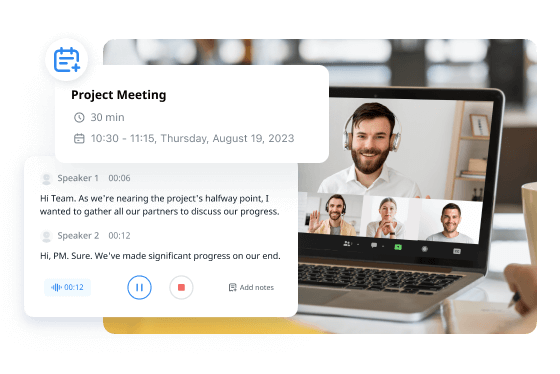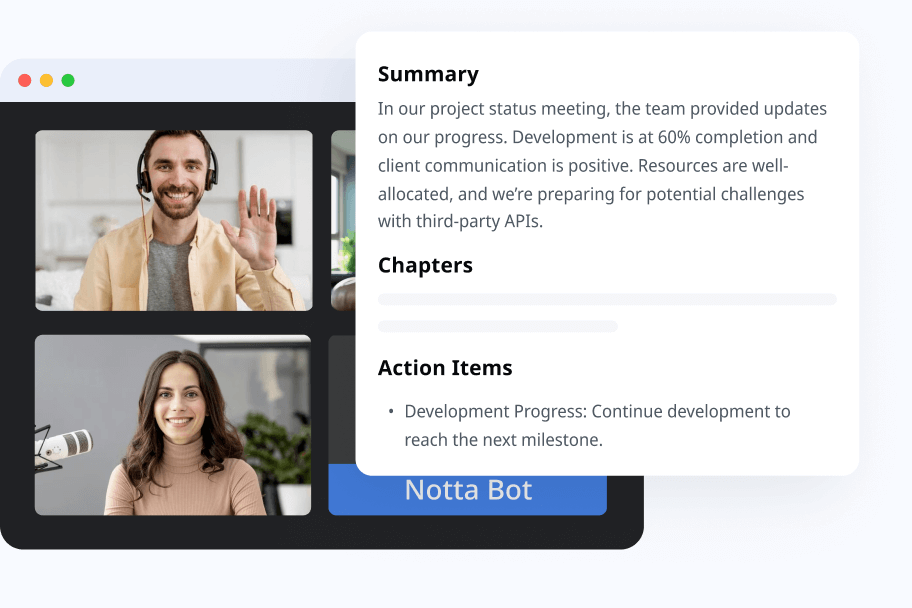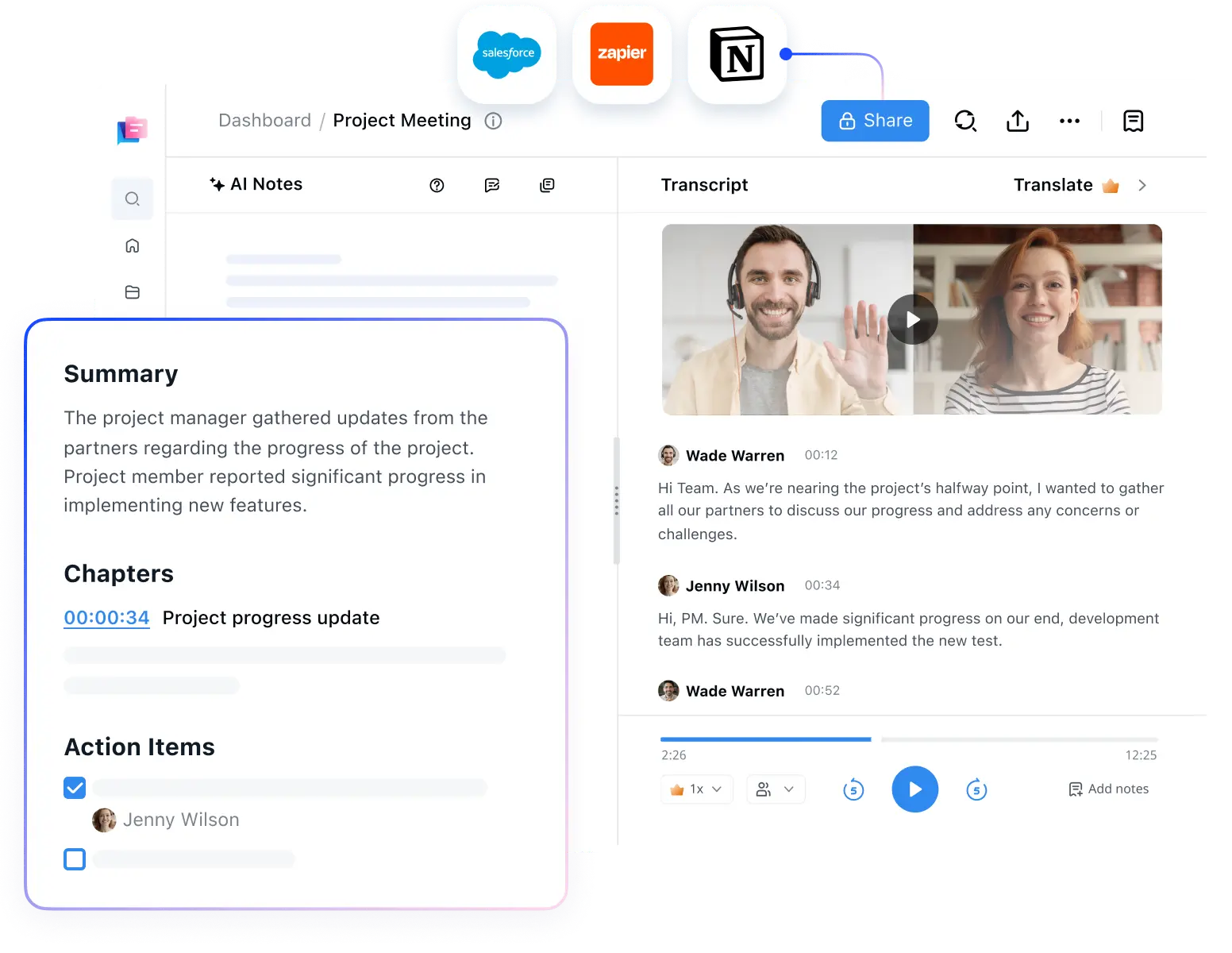We all have been part of a meeting that wasted our time maybe because the meeting host did not follow a set agenda or there was no clear objective from start to end. As a part of the sales team previously, I know the challenges of scheduling and hosting productive meetings that benefit the entire team and company.
In this guide, I'll help you learn how to run a sales meeting that actually focuses on the key discussion points and provides the right outcome. I'll also share a sales meeting agenda template so you don't have to spend time putting together the important points and creating one from scratch.
What is a sales meeting?
A sales meeting is an internal gathering where sales leaders and reps come together to discuss current sales performance, insights, and next priorities. The sales leaders, including the sales manager, chief revenue officer, and director of head sales, highlight important updates in the meeting. However, the frequency of sales meetings might vary depending on your company's sales cycle, team cycles, and specific needs.
What to talk about in a sales meeting?
Before you schedule a meeting and send invites to the attendees, you want to be sure you know what needs to be discussed. While the exact discussion points might depend on what you think is important, here I'll outline some common things you shouldn't miss.
Goals: A sales meeting is a great time to discuss a company's goals and milestones. For example, if you're planning to increase the marketing yearly sales or bring in new customers, the team can collectively discuss and find different ways to achieve the goals.
Customer feedback: The sales reps and sales leaders review the recent customer feedback and prepare a plan to improve the overall performance.
Analyze customer needs: Sales representatives should keep the ever-changing needs of clients and customers in mind. The sales meeting is an opportunity for the team to understand exactly what clients are looking for.
Discussing roadblocks: You can use the sales meeting to ask everyone about the challenges or hurdles they faced.

What are the types of sales meetings?
You can host different types of sales meetings. However, the type of meeting will depend on what you are planning to achieve. Here's what the common sales meeting types look like:
Team meeting: It's the most common type of sales meeting, in which the entire sales team collectively analyzes performance, sets goals, and prepares a plan to achieve desired outcomes.
Marketing meeting: If you want to adjust the marketing techniques to increase sales and close more leads, then you may host marketing meetings.
Product launch meeting: When there's any new product that you need to launch, the product launch meeting might make more sense.
Sales pitch meeting: It's generally held with potential clients and customers to help them understand the features of products/services and close more sales.
One-on-one meeting: When a salesperson and manager schedule the call to either set goals or review performance, they can schedule a one-on-one meeting.
How to run an effective sales meeting?
Sales meetings are important for overall business growth and profit. Since these kinds of meetings are important, the planning needs proper structure. Here, I'll walk you through how I plan and run sales meetings, from the initial planning to the follow-up.
1. Set clear meeting objective
Your sales meeting should have a clear objective. It could be reviewing project plans or resolving customer questions. Ideally, it's important to have one meeting goal and stick with it from start to end.
2. Share the agenda
I can't stress this enough: meeting agendas act as the foundation and roadmap — both at the very same time — for your meeting. If you have an unclear agenda, everyone in the meeting room will suffer from unfruitful and unproductive discussions. Once you've prepared a sales meeting agenda, holding onto it won't do the work. You would need to share those agendas with the attendees ahead of time.
3. Keep meetings focused
I've attended my fair share of unproductive meetings that left me with no knowledge about the topic. But if you want to avoid hosting meetings that quickly go off the rails, make sure to follow an agenda and set a time limit for each discussion. It's one of the best ways to keep meetings focused and short.
4. Ask for feedback
Don't forget to ask a few feedback questions so you can improve future meetings, increase collaboration, build trust, and (most importantly) eliminate roadblocks. For example, you can simply ask: How was the meeting? Did you come across any challenges that made it hard to achieve the goals? and so on.
5. Share action items and meeting summary
Remembering what everyone agreed to do during the meeting can be one of the hardest parts of the job. After a few hours of the meeting, send a summary with action items to all the attendees. While you can always ask a meeting attendee to create notes and action items, it can be time-consuming.
If you want to create and track action items without any error or time investment, the Notta AI meeting assistant can help. It's an AI notetaker that can record and transcribe your online meetings held on video conferencing platforms like Zoom, Microsoft Teams, Webex, or Google Meet. You can then summarize the lengthy transcripts into different chapters and share the summary with the attendees.

How to prepare for a successful sales meeting?
When there are 4+ people in the room discussing a topic, someone might dominate the discussion and end up wasting everyone's time. By putting a structure in place, you can run effective sales meetings to free up everyone so they can focus on more important tasks.
1. Decide if there's a need for a meeting
Whether working remotely or not, it's easy to fall into the trap of scheduling unnecessary meetings. If you think the meeting could be an email, go ahead and save time for everyone. On the other hand, if it's necessary to hold a meeting, determine the starting and ending time — and stick with it!
2. Invite the right people
While it might be tempting to ask everyone to join the meeting, I suggest inviting only the right people. By right, I mean those who can actually gain something valuable from the meeting.
3. Know the outcomes
Every meeting should have a clear purpose, which you'll need to identify before you prepare the agenda and share it with everyone. Remember, everyone's time is valuable, so make sure the meeting is productive.
Sales meeting agenda template
I know from my past experience that running effective sales meetings can be challenging. But one thing I've found helpful is to create a sales team meeting agenda and share it with the attendees. Here, I'll include a sales meeting agenda template to make sure that nothing important is missed.
Template:
Heading: Sales Meeting Agenda
Date: June 5, 2024
Time: 10:00 AM
Location: Google Meet
Duration: 60 minutes
Open the meeting (5 minutes)
Start the sales team meeting by welcoming everyone and discussing the objectives briefly.
Review past performance (10 minutes)
The sales leader will analyze the sales KPIs and compare the performance with the previous session.
Wins and recognitions (5 minutes)
Here, the meeting host will celebrate successes and contributions.
Any challenges or roadblocks (10 minutes)
Everyone can share one or two challenges they faced when completing the assigned tasks. Then, the attendees can collectively brainstorm for solutions.
Action item and next steps (5 minutes)
Once the challenges or roadblocks are discussed and solutions are proposed, make sure to set clear tasks and responsibilities. If you're planning to host another meeting after a week or month, share the details at the end.
Tips for a productive sales meeting
If you're taking the lead on meetings with the entire sales team, it can set up the project for success from the start. Here are a few more tips to make meetings more productive:
Set start and end time: Respect the time of all the attendees by following a strict schedule. You'll need to avoid spending more time on unimportant things and focus on what matters the most.
Be punctual: Being punctual is important, especially when there are a lot of people waiting for you. If you're running late for the meeting, make sure to inform everyone immediately.
Leave time for discussion: Every attendee will have something to contribute, so make sure you're allotting ⅔ of the meeting time for healthy discussion.
Follow-up after the meeting: Within 12 hours after the sales meeting, send a follow-up email to everyone who was there. The aim is to share the summary and schedule the next touchpoint.
Key takeaways
If you want to make the process of hosting productive sessions a lot easier, remember to use the sales meeting agenda template I provided. If you're looking to automate other meeting-related tasks such as recording, transcribing, and summarizing spoken words, try Notta. It's an AI meeting assistant that can automatically join online sales meetings to record and transcribe conversations with 98.86% accuracy.

Run effective sales meetings
Notta AI meeting assistant records, transcribes, and summarizes meetings so everyone can stay engaged without missing important details.
FAQs
How often should you have a sales meeting?
There's no hard and fast rule here — the frequency of your sales meetings will vary depending on several important factors, such as the size of the sales organization, company culture, how the sales team is performing, and what outcomes you are planning to achieve. If you're finding a sweet spot that works in most cases, you may consider hosting weekly sales meetings.
Why are sales meetings important?
Sales meetings help the entire team be on the same page, achieve targets, motivate the team, and make sure everyone understands the company's goals. Such meetings are important if you want to help the entire team understand how to perform better.
How to follow up after a sales meeting?
Sending a short follow-up email after a sales meeting is important to help the attendees understand what they need to complete. It typically includes the summary of the discussion and schedule when you're planning the next session. Here's an example of a follow-up you might send:
'Thank you for the time yesterday! We covered a lot of topics and shared solutions to the common problems. Here's the meeting summary [insert the link here], with the next steps below.'



